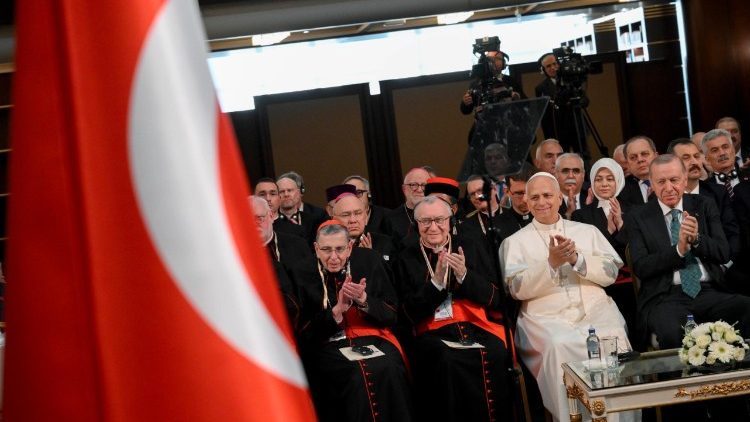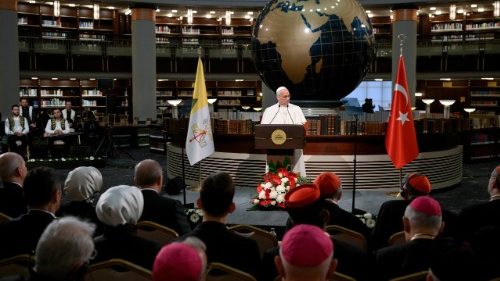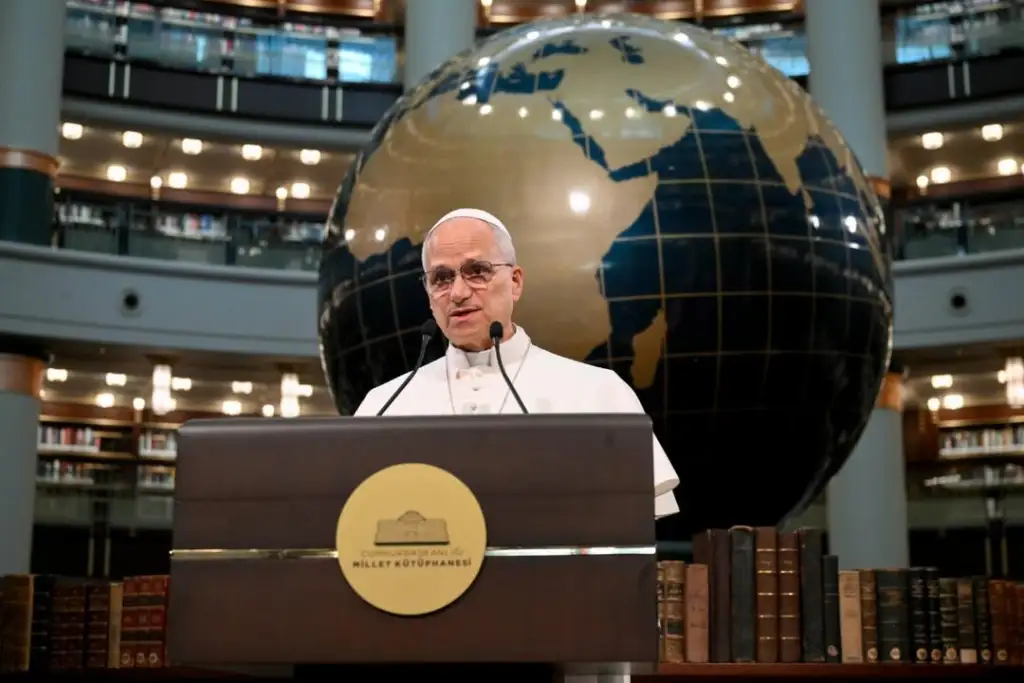Pope Leo XIV undertook his first international apostolic journey on Thursday, visiting Turkey in a symbolic gesture that reinforces interreligious dialogue and global fraternity. Elected as Peter’s successor on May 8, 2015, and having officially begun his Petrine ministry with a Mass in St. Peter’s Square on May 18, this trip marks the Pontiff’s debut outside of Italy. The tour, which will also include a visit to Lebanon, begins in Ankara with a moving address to Turkish authorities, civil society, and the diplomatic corps, highlighting Turkey’s historical role as the cradle of Christianity and a “bridge” between continents and cultures.
In a hall filled with government representatives, religious leaders, and diplomats, Pope Leo XIV—who assumed the papacy after the death of Francis in 2014—emphasized the need to build “fraternity” in a world polarized by conflict and inequality. “This land is inextricably linked to the origins of Christianity, and today it invites the children of Abraham and all humanity to a fraternity that recognizes and appreciates differences,” the Pontiff proclaimed at the beginning of his address, directed to the Turkish president and those present.
The speech, delivered in English with simultaneous Turkish translation, centered on the image of the bridge over the Dardanelles Strait, the official logo of the trip, as a metaphor for Turkish identity. “Before uniting Asia with Europe, East with West, this bridge connects Turkey with itself,” Leo XIV stated, emphasizing that the country’s internal diversity is not a weakness, but a richness that fosters great civilizations. In this regard, he warned against the “uniformity” that impoverishes society and advocated for a “culture of encounter,” inspired by the teachings of his predecessor, Pope Francis, and by the figure of Saint John XXIII, known as the “Turkish Pope” for his work as apostolic delegate to the country between 1935 and 1945.

The Pope extended his message to pressing global issues. He called for the protection of God’s creation in the face of Turkey’s natural beauty, criticizing “ambitions and choices that trample on justice and peace.” With a nod to technological advancements, he warned of the risk that artificial intelligence could “exacerbate injustice” if it is not directed toward the common good, reproducing “our own preferences” instead of promoting solidarity. “Justice and mercy challenge the ‘might makes right’ mentality and dare to ask that compassion and solidarity be the authentic criteria for development,” he declared, recalling the “merciful and compassionate” God of Psalm 103.
The Pope dedicated a special chapter to the family, a pillar of Turkish culture, as the “first nucleus of social life” where the value of “the other” is learned. He praised local initiatives that support marriage and childbirth, rejecting “consumerist economies” that turn loneliness into a business. He also highlighted the role of women in Turkish society: “Through their studies and active participation in professional, cultural, and political life, women serve their country and exert a positive influence on the international stage.” This emphasis on equality and women’s empowerment resonates with Turkey’s efforts to modernize its society, although challenges regarding gender rights and civil liberties persist.
Pope Leo XIV recalled the visits of his predecessors—Paul VI in 1967, John Paul II in 1979, Benedict XVI in 2006, and Francis in 2014—as proof of the “good relations” between the Holy See and the Republic of Turkey. “We wish to cooperate in building a better world with the contribution of this country, which is a bridge between East and West, Asia and Europe, and a crossroads of cultures and religions,” he affirmed. In the context of the anniversary of Nicaea, he invoked the spirit of dialogue of the first eight ecumenical councils held on what is now Turkish soil, urging everyone to “promote dialogue with firm resolve and patient determination.”
The Pope did not shy away from global tensions: he denounced a “piecemeal third world war,” fueled by economic and military power strategies that divert resources from real challenges such as peace, the fight against hunger, health, education, and environmental protection. “The future of humanity is at stake. Let us not give in under any circumstances!” he exclaimed, proposing that the Holy See, with its “spiritual and moral strength,” collaborate with nations committed to integral development. “Let us walk together, in truth and friendship, humbly trusting in God’s help,” he concluded, before an audience that warmly applauded.

This apostolic journey, which will last until December 2 and include Lebanon, comes at a time of regional instability, marked by conflicts in the Middle East and migration tensions in the Mediterranean. The presence of Leo XIV in Turkey—a country with a Christian minority comprising just 0.2% of its 85 million population—reinforces the Catholic Church’s commitment to ecumenism and interreligious dialogue, in a context where Sunni Islam predominates under the leadership of President Recep Tayyip Erdoğan. Analysts see this trip as a gesture of continuity with the legacy of Pope Francis, but with a renewed emphasis on the “unity of the human family” in the face of global polarization.
The speech has been received with optimism by the local Catholic community, which numbers around 35,000 faithful, and by diplomatic observers, who highlight Turkey’s potential as a mediator in global crises. As the Pope prepares for his pilgrimage to İznik, his message resonates as an urgent call for reconciliation in a fractured world.
***
APOSTOLIC JOURNEY OF HIS HOLINESS POPE LEO XIV
TO TÜRKIYE AND LEBANON
WITH A PILGRIMAGE TO IZNIK (TÜRKIYE)
ON THE OCCASION OF THE 1700th ANNIVERSARY OF THE FIRST ECUMENICAL COUNCIL OF NICAEA
(27 November – 2 December 2025)
MEETING WITH THE AUTHORITIES, CIVIL SOCIETY AND THE DIPLOMATIC CORPS
ADDRESS OF THE HOLY FATHER
Ankara
Thursday, 27 November 2025
____________________________________
Mr President,
Distinguished Authorities,
Members of the Diplomatic Corps,
Ladies and Gentlemen,
Thank you very much for your kind welcome! I am pleased to begin the Apostolic Journeys of my Pontificate with a visit to your country, for this land is inextricably linked to the origins of Christianity, and today it beckons the children of Abraham and all humanity to a fraternity that recognizes and appreciates differences.
The natural beauty of your country urges us to protect God’s creation. Moreover, the cultural, artistic and spiritual richness of the places you inhabit reminds us that when different generations, traditions and ideas meet, great civilizations are forged in which development and wisdom are drawn together into a unity. On the one hand, it is true that human history has centuries of conflict behind it, and that the world around us is still destabilized by ambitions and choices that trample on justice and peace. At the same time, when faced with challenges, being a people with such a great past is both a gift and a responsibility.
The image of the bridge over the Dardanelles Strait, chosen as the logo for my journey, eloquently expresses your country’s special role. You have an important place in both the present and future of the Mediterranean, and of the whole world, above all by valuing your internal diversity. Even before linking Asia with Europe, East with West, this bridge connects Türkiye to itself. It combines different parts of the country, making it from within, as it were, a “crossroads of sensibilities.” In such a case, uniformity would be an impoverishment. Indeed, a society is alive if it has a plurality, for what makes it a civil society are the bridges that link its people together. Yet today, human communities are increasingly polarized and torn apart by extreme positions that fragment them.
I willingly assure you that Christians desire to contribute positively to the unity of your country. They are, and feel part of, Turkish identity, which was highly esteemed Saint John XXIII, whom you remember as the “Turkish Pope” for the deep friendship that always bound him to your people. He was Administrator of the Latin Vicariate of Istanbul and Apostolic Delegate in Türkiye and Greece from 1935 to 1945, and worked tirelessly to ensure that Catholics did not exclude themselves from the ongoing development of your new Republic. He wrote during those years, that here in this Nation, “we Latin Catholics of Istanbul, and Catholics of other rites, Armenian, Greek, Chaldean, Syrian etc., are a modest minority living on the surface of a vast world with which we have only limited contact. We like to distinguish ourselves from those who do not profess our faith: our Orthodox brothers, Protestants, Jews, Muslims, believers and non-believers of other religions… It seems logical that everyone should mind their own business, their own family or national traditions, keeping within the limited circle of their own community… My dear brothers and sisters, my dear children, I must tell you that in the light of the Gospel and of Catholic principles, this is a false logic.”[1] Since then, great strides have undoubtedly been made within the Church and in your society, yet those words still resonate strongly in our day, and continue to inspire a more evangelical and genuine way of thinking, which Pope Francis called the “culture of encounter.”
Indeed, from the very heart of the Mediterranean, my venerable Predecessor opposed the “globalization of indifference,” by inviting us to feel the pain of others and to listen to the cry of the poor and of the earth. He thus encouraged us to compassionate action, which is a reflection of the one God who is merciful and compassionate, “slow to anger and abounding in steadfast love” (Ps 103:8). The image of your great bridge is also helpful in this sense, for God, in revealing himself, established a bridge between heaven and earth. He did so in order that our hearts might change, becoming like his. It is a vast suspension bridge, almost defying the laws of physics. Likewise, in addition to its intimate and private aspects, love too has a visible and public dimension.
Furthermore, justice and mercy challenge the mentality of “might is right,” and dare to ask that compassion and solidarity be considered as the authentic criteria for development. For this reason, in a society like the one here in Türkiye, where religion plays a visible role, it is essential to honor the dignity and freedom of all God’s children, both men and women, fellow nationals and foreigners, poor and rich. We are all children of God, and this has personal, social and political implications. Those with hearts docile to the will of God always promote the common good and respect for all. Today, this is a great challenge, which must reshape local policies and international relations, especially in the face of technological developments that could otherwise exacerbate injustice instead of helping to overcome it. Even artificial intelligence simply reproduces our own preferences and accelerates processes that, on closer inspection, are not the work of machines, but of humanity itself. Let us work together, therefore, to change the trajectory of development and repair the damage already done to the unity of our human family.
Ladies and gentlemen, I just mentioned the human family. This metaphor invites us to establish a connection – once again, a bridge – between our common destiny and the experiences of each individual. Indeed, for each one of us, the family was the first nucleus of social life, in which we learned that without the “other” there is no “I.” More so than in other countries, the family retains great importance in Turkish culture, and there is no shortage of initiatives to support its centrality. Indeed, attitudes essential for civil coexistence, plus the initial and fundamental sensitivity to the common good, mature precisely within the family. Of course, every family can also close in on itself, cultivate hostility, or prevent some of its members from expressing themselves to the point of hindering the development of their talents. Nevertheless, people do not obtain greater opportunities or happiness from an individualistic culture, nor by showing contempt for marriage or shunning openness to life.
Moreover, consumerist economies are deceptive in that loneliness becomes a business. We should respond to this with a culture that appreciates affection and personal connection. For it is only together that we can become our authentic selves. Only through love does our inner life become profound and our identity strong. Those who scorn fundamental human ties, and fail to learn how to bear even their limitations and fragility, more easily become intolerant and incapable of interacting with our complex world. At the same time, it is within family life that the value of conjugal love and the contribution of women emerge in a very specific way. Women, in particular, through their studies and active participation in professional, cultural and political life, are increasingly placing themselves at the service of your country and its positive influence on the international scene. We must greatly value, then, the important initiatives in this regard, which support the family and the contribution that women make toward the full flowering of social life.
Mr President, may Türkiye be a source of stability and rapprochement between peoples, in service of a just and lasting peace. The visits to Türkiye by four Popes – Paul VI in 1967, John Paul II in 1979, Benedict XVI in 2006 and Francis in 2014 – show that the Holy See not only maintains good relations with the Republic of Türkiye, but also desires to cooperate in building a better world with the contribution of this country, which is a bridge between East and West, between Asia and Europe, and a crossroads of cultures and religions. The particular occasion of my own visit, the 1700th anniversary of the Council of Nicaea, speaks to us of encounter and dialogue, as does the fact that the first eight ecumenical councils were held in the lands of present-day Türkiye.
Today, more than ever, we need people who will promote dialogue and practice it with firm will and patient resolve. In the aftermath of the tragedies of two world wars, which saw the building of large international organizations, we are now experiencing a phase marked by a heightened level of conflict on the global level, fueled by prevailing strategies of economic and military power. This is enabling what Pope Francis called “a third world war fought piecemeal.” We must in no way give in to this! The future of humanity is at stake. The energies and resources absorbed by this destructive dynamic are being diverted from the real challenges that the human family should instead be facing together today, namely peace, the fight against hunger and poverty, health and education, and the protection of creation.
The Holy See, with only its spiritual and moral strength, wishes to cooperate with all nations that have at heart the integral development of each and every person. Let us walk together, then, in truth and in friendship, humbly trusting in the help of God.
Thank you.
________________________
[1] Angelo G. Roncalli (John XXIII), La predicazione a Istanbul. Omelie, discorsi e note pastorali (1935-1944), Olschki, Firenze 1993, 367-368.
